Genre: Fighting Developer: Sculptured Software Publisher: Williams Ent. Players: 1-2 Released: 1995
From the back of the box: “Plunge into the darkness. It’s your fight. It’s your life. Mortal Kombat 3.”
Mortal Kombat III was released in 1995, the same year the 32-bit systems were originally released. At this point the 16-bit generation had already hit its peak, and was beginning to wane.
It seems that the creators of the Mortal Kombat series wanted to create a new fighter to surpass the previous two installments. Both of the previous Mortal Kombat games were legendary at this point, the first Mortal Kombat for opening the door to violent fighting games, and the second for its incredibly tight gameplay.
Using tactics that seemed popular in other fighting games, the development team added all kids of new features and gimmicks to revamp the fighting system for this installment. In addition to their traditional system of blocks, high & low punches and kicks, they added a run feature as well as a combo system.
The combo system worked similarly to the one featured in Killer Instinct, which popularized the concept of combo’s, or moves that when used consecutively, would create devastating attacks. Extra points were awarded for combos, and the victim of the attack would be unable to respond until the combo was complete. Often, the combos would be so quick, the opponent wouldn’t be able to respond at all. This kept the fights short and intense.
Unfortunately, there were several issues with the game that caused it much criticism. Many of the more popular characters from previous installments were changed and/or removed entirely. Even though the eight new characters were creative and interesting, they lacked the overall appeal that the original cast held.
The story also continued to get wilder. Fighting games aren’t exactly known for their creative writing, but the story of the Mortal Kombat universe continued to veer into the realms of sci-fi. The original game, was slightly fictional, but held quite a bit of oriental mystique with it. This changed as the majority of the cast no longer belonged to the oriental myth or style. Even though this makes a more worldly and interesting cast, it causes the series to lose something that set it apart from other fighting games of the era.
Other unique problems were presented on the Genesis platform. Because of the limited color palette, many characters seem particularly blocky or washed out. This effect also goes on to the backgrounds, which are pre-rendered, animated, and multi-layered (parallax). Even though there were severe graphical limits, this game played incredibly well, and looks very nice for a Genesis game. This unfortunately doesn’t hold up against the SNES version, which during this time period was making beautiful colorful games. The Playstation and Saturn systems were being released, and the 32-bit hype engine was at full-throttle. The 64 color Genesis simply couldn’t compare.
The positive news is that the game controlled as smoothly as in Mortal Kombat II, which was itself an incredible game. The gameplay was still very strong in this installment, and new fatalities were added, along with other marketing gimmicks, such as the unmasking of Sub-Zero. New gimmicks such as upper-cutting the opponent into a whole new battlefield made the game a little more interesting and fresh.
Mortal Kombat III would have fared better had it kept more of the original cast, used one of the Sega expansions (CD or 32x) for improved performance, or maybe even had a bit more marketing (I didn’t play it until 1998). In addition, the original Mortal Kombat, with its violence, blood and fatalities was known for its realism. Beginning with Mortal Kombat II, the series added alternate endings in addition to the usual fatalities, such as “babalities”, and “friendships” that effectively ended the match. This taunted the other player; this works as well as a fatality, but without the added violence.
In conclusion, Mortal Kombat III is a well rounded fighter in its own right. It doesn’t live up to the legacy of Mortal Kombat II, because of its lack of interesting and cool characters. On its own, Mortal Kombat III stands to the test of time as a great Genesis title. Unfortunately at the time of its release, the Genesis system could not hold against the competition in this cutting edge genre.
SCORE: 7 out of 10

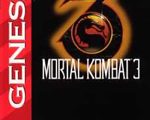
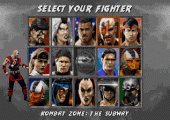
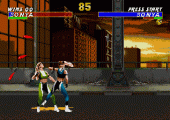
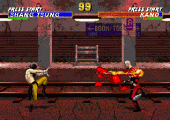
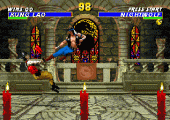
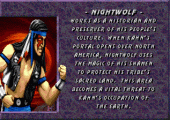
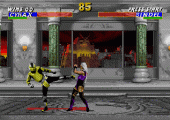
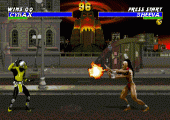
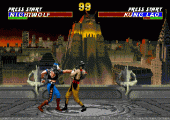
Recent Comments